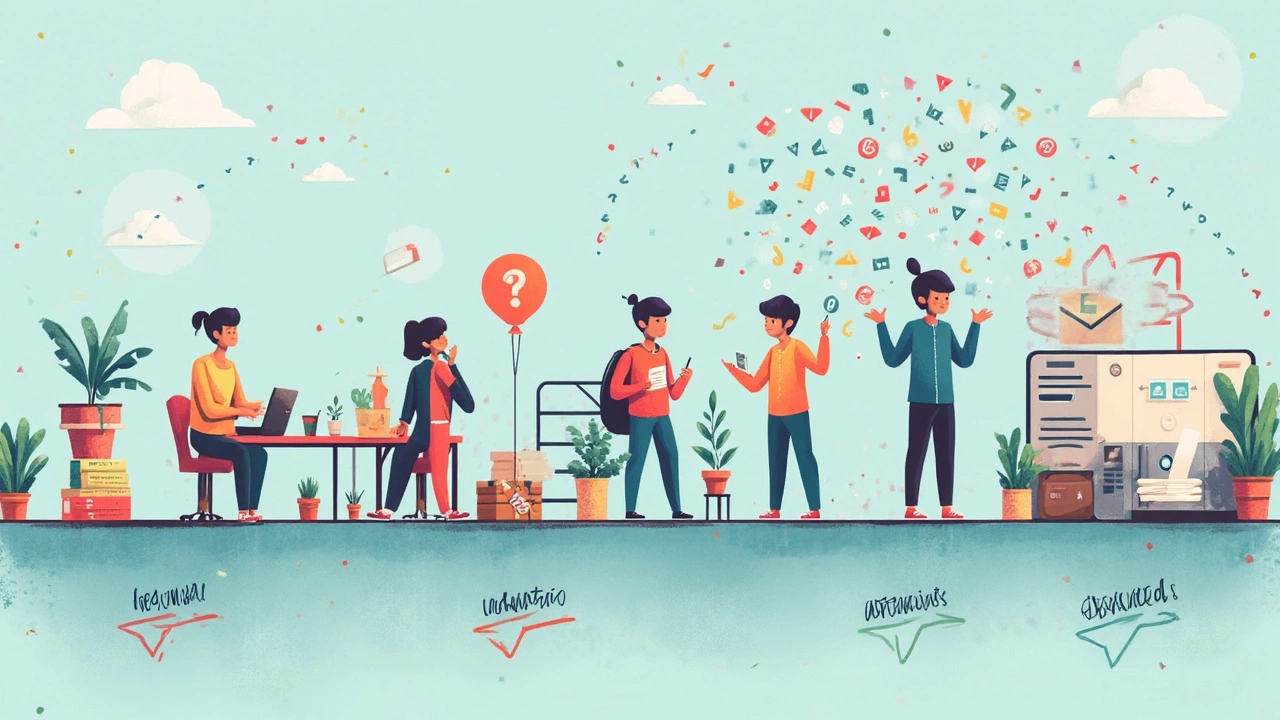
Some people claim you can learn to code in a weekend. Others say it takes years before you’re ready for anything real. Who’s right? Here’s the truth: it depends so much on your starting point, your goal, and how much time you actually spend.
If your plan is to build a simple website or automate a boring spreadsheet, you could pick up enough basics in a week or two—sometimes even less, especially if you use the right tutorials. But getting hired as a developer, tackling algorithms, or building complex apps? That’s a whole other game.
The crazy part is that learning to code never really “ends.” Even pros run into stuff they’ve never seen before. The good news: you don’t need to know everything to get real results. Breaking down what you want to achieve—and matching that to real-world timelines—makes everything a lot less overwhelming.
- Why 'Learning to Code' Just Isn’t One Thing
- Common Timelines and What Affects Them
- Speeding Up the Process: Tips That Actually Work
- Roadblocks That Slow Most Beginners Down
- When Do You Actually ‘Know How to Code’?
Why 'Learning to Code' Just Isn’t One Thing
When people talk about learning to code, they usually lump it into one big thing—as if all programmers do the same stuff. But coding is more like learning a new sport: there are different positions, rules, and even playing fields depending on what you want to achieve.
If you want to make a simple website, you’ll need to focus on HTML, CSS, and a bit of JavaScript. But if you’re drawn to building phone apps, that means learning Swift for iPhones or Kotlin for Android. Data scientists spend their time in Python, R, and sometimes SQL. Each path has different skills and tools. That’s why someone who cranks out WordPress sites probably doesn’t know the first thing about building a game engine—or cracking a tricky machine learning problem.
Even "full stack" developers usually end up better at one end—front-end or back-end—than the other. Experts at Stack Overflow have pointed out that, "Programming covers a massive landscape. No one can know it all."
"The biggest myth is that there's a finish line. Technology is always changing, and learning to code happens in layers, not all at once." – Stack Overflow 2023 Developer Survey
It helps to pick your goal early. Want to automate boring office tasks? You’ll get far with just some basic Python. Dreaming of a tech job? You’ll need to dig into algorithms, data structures, and probably version control with Git. Each route shapes how long you’ll spend on different topics. So, before you even start searching for learn to code classes, get specific about what you actually want to make or solve. That’s how you make real progress—and don’t waste time learning things you’ll never use.
Common Timelines and What Affects Them
The time it takes to learn to code swings a lot—from just a few weeks for basics, to a year or more if you're shooting for a job in tech. Here’s what often happens in real life:
| Goal | Time (Part-Time: 10-15 hrs/week) | Time (Full-Time: 30-40 hrs/week) |
|---|---|---|
| Basics (HTML, CSS, simple Python/JavaScript) | 1-2 months | 2-4 weeks |
| Build portfolio projects | 4-6 months | 2-3 months |
| Job-ready skills (front-end/back-end) | 8-12 months | 4-6 months |
Your timeline depends on way more than just the number of hours you spend. Someone with a knack for logic might breeze through things that stump others for days. If you’ve got time to do a deep-dive every day, you’ll move faster—but real life isn’t always that flexible. Here’s what most affects the pace:
- Your background: Already comfortable with computers? That helps. Math whiz or problem-solver? Nice boost.
- Your goals: Want to make tiny scripts, creative websites, or go full-stack? Each level needs more time and depth.
- Your method: Bootcamps, college, self-teaching—these all move at different speeds. Bootcamps cram it in fast but you’ll need to commit lots of hours weekly. Traditional classes move slower but may go deeper.
- Consistency: Skipping weeks or stopping and starting means re-learning things, which slows progress big-time.
- Community and support: Having a mentor or at least an active online group helps you solve problems way faster than Googling alone.
One wild stat: according to Stack Overflow’s 2024 Developer Survey, most pros say they became employable in less than two years after starting from scratch. Seriously, two years or less. But those folks usually hustle pretty hard—think 15-30 hours a week, often juggling side projects and constant learning.

Speeding Up the Process: Tips That Actually Work
If you want to learn to code faster, you have to ditch the myths and work smart. There’s no secret sauce, but some strategies give you real results. Let’s get into what actually moves the needle.
- Set a Real Goal, Not a Vague One. Don’t just say, “I want to code.” Instead, lock in on something like, “I’ll build a to-do app with React” or “I’ll automate my budgeting in Python.” Real projects force you to connect the dots and keep you from drifting.
- Code Every Day—Even If It’s Just 20 Minutes. Consistency beats grinding for hours once a week. You’ll remember more, and coding will feel less intimidating over time.
- Mix Tutorials With Real Practice. Passive watching doesn’t cut it. After you watch a tutorial, tweak the code, break it on purpose, and fix it. This struggle is where real learning happens.
- Find the Right Community. Forums, Discord servers, or even a study buddy can keep you on track. Being able to ask questions when you're stuck slashes your frustration time by half.
- Write Stuff Down. Weirdly, keeping a notebook with code errors and new tricks helps you solve problems faster next time. Your future self will thank you.
If you’re curious about how these tips impact learning, check out this table—real data from a 2023 Stack Overflow survey on new coders’ progress:
| Habit | Average Months to Build a First Project |
|---|---|
| Daily Coding (at least 20 min) | 4 |
| Coding 1-2x a Week | 8 |
| Active Community Member | 4 |
| No Community | 7 |
| Applied What They Learned Immediately | 3 |
| Only Watched Tutorials | 9 |
Bottom line—the more you actually build, the faster you make real progress. Finishing small projects, wrestling with errors, and talking with other learners beats memorizing syntax any day.
Roadblocks That Slow Most Beginners Down
The journey to learn to code feels uphill for a lot of beginners. The obstacles aren’t always about being bad at math or not having a “techy” brain. Let’s get real about what actually trips people up—because most of these issues are avoidable.
- Trying to learn everything at once. This is probably the #1 trap. With so many programming languages, frameworks, and tools out there, it’s easy to spread yourself too thin and end up burnt out—knowing a little about a lot, but not enough to do anything interesting.
- Getting stuck on ‘tutorial hell’. Watching endless video tutorials without building anything on your own tricks your brain into thinking you’re learning, but the info isn’t sticking. Real learning happens when you try things yourself—and mess up.
- Underestimating debugging. Beginners blow hours stressing out about errors that are totally normal. Debugging is annoying, but it’s half the job. The pros spend just as much time fixing as building.
- Lack of real projects. If you never build something that matters to you—a basic website for a side hustle, a bot for your Discord—your motivation tanks fast. Having a project with real stakes keeps you learning even when things get tough.
- Imposter syndrome. It’s a cliché, but it’s very real. Studies show that up to 70% of new coders feel like they’re faking it, even after making progress. This can stall you or make you quit way too early.
What does this look like in the real world? Check out this table with the most common roadblocks from a 2024 survey of 2,000 beginner coders:
| Roadblock | Percentage of Beginners |
|---|---|
| Losing motivation after getting stuck | 61% |
| Too many resources, not knowing where to focus | 54% |
| Struggling with debugging | 47% |
| Feeling like an imposter | 41% |
| No support or coding community | 33% |
If you run into one (or all) of these, you’re not alone. The key is spotting these problems early and pushing through with the right mindset. Focus on one language, start building small, break bugs into bite-size steps, and don’t go it alone—asking for help is part of the job, not a weakness.

When Do You Actually ‘Know How to Code’?
This is where things get tricky. There’s no magical point where someone shakes your hand and says, “Congrats, you know how to code now.” What actually happens is you hit a point where you can solve problems on your own—even if you’re still Googling stuff and reading code you don’t fully get at first. Nobody expects you to have everything memorized.
Honestly, knowing how to code starts when you can do these things without freaking out:
- Build a basic project from scratch, not just follow a tutorial line by line.
- Debug your own mistakes (and know how to search for fixes).
- Read other people’s code and understand what’s happening.
- Explain what your code does to someone else.
If you’re looking for a number, a Stack Overflow developer report found about three months of focused study gets most people comfortable with entry-level tasks in a given programming language. But real confidence usually takes closer to six months to a year of regular practice.
Here’s a quick look at how long it typically takes folks at different commitment levels to reach that “I know how to code” feeling:
| Weekly Hours of Practice | Reach Basic Proficiency | Build Full Projects |
|---|---|---|
| 5 hours | 6-8 months | 12+ months |
| 10 hours | 3-4 months | 7-9 months |
| 20+ hours | 1-2 months | 4-6 months |
The coolest part? Your “I know how to code” moment shows up sooner if you focus less on perfection and more on shipping stuff that actually works. Don’t wait for permission. Start building, keep breaking things, and sooner than you think, others will ask you for coding help.
